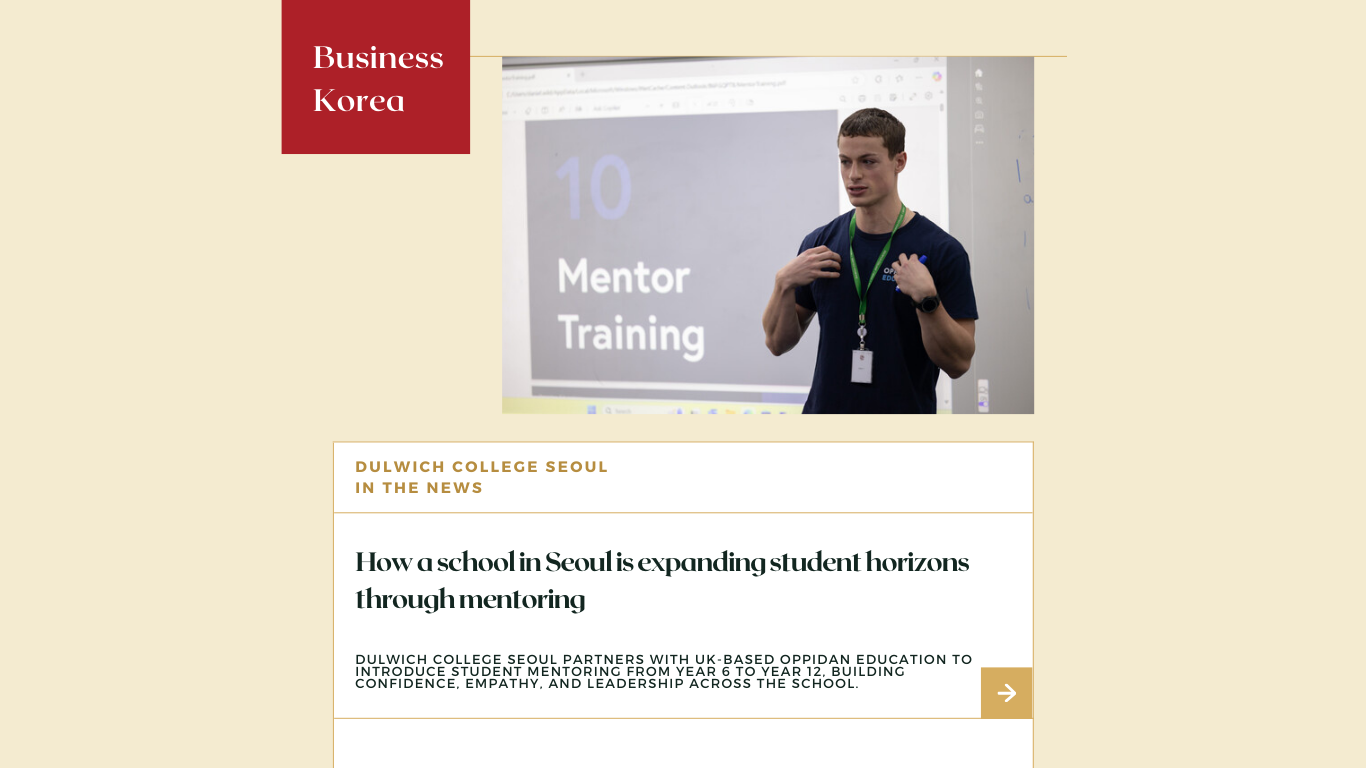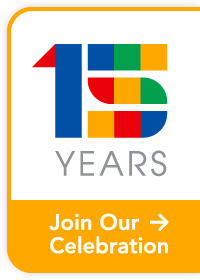The Power of Mentoring at Dulwich College Seoul – Featured in Business Korea

Does mentoring make a difference? Judging by the many organizations and Fortune 500 companies that have adopted a mentoring program, the answer seems to be a resounding yes. Mentees get an opportunity to open pathways for self-reflection and personal and professional development growth. Mentors give back while learning more about themselves in the process.
What if mentorship started earlier, such as during one’s school years? Primary and secondary schools are embracing this question based on the thriving experience of Oppidan Education, a global education company based in the U.K. that specializes in the academic development of young people through mentoring programs. Founded in 2016, Oppidan now works with over 150 schools worldwide, including the prestigious Eton College and Dulwich College London.
What if mentorship started earlier, such as during one’s school years? Primary and secondary schools are embracing this question based on the thriving experience of Oppidan Education, a global education company based in the U.K. that specializes in the academic development of young people through mentoring programs. Founded in 2016, Oppidan now works with over 150 schools worldwide, including the prestigious Eton College and Dulwich College London.
Finding a good fit in Seoul
One local school that is working with Oppidan is Dulwich College Seoul (DCSL), an international school located in the capital’s Seocho District. Its 700 students aged 3 to 18 come from 46 different countries, with the oldest year groups taking on the academically rigorous International Baccalaureate Diploma Programme that paves the path to entering some of the world’s top universities.
This relationship came about as the school’s leadership team wanted to formalize the mentorship that had always been part of the fabric at DCSL. Oppidan was already working with students at Dulwich College London, DCSL’s founding school, and extending their reach to Dulwich College Seoul was a natural partnership.
“We want our students to be active global citizens and so we needed a company that recognized that as well as our diversity given how many of our students are third culture kids,” recalls Suzanne Pugh, Head of Senior School at DCSL. “Another core value for us is excellence, and we knew that the Oppidan mentors are all people who have experienced excellence in different ways. So, we felt they were a good fit for us.”
Students are mentored; students become mentors
Another strong aspect of the appeal to Ms. Pugh and her colleagues is the way students are not only mentored by Oppidan representatives - they are also taught how to become mentors themselves.
In this inaugural year of Oppidan mentorship at DCSL, Year 9 students (aged 13-14) are first learning how to become mentors and then mentoring their Year 6 peers (aged 10-11) as they go up to Year 7, moving from Junior School to Senior School. These year groups were chosen as a bridge across a key period of transition for DCSL students. It can be daunting for the younger ones, while early teenagehood is typically a time when students can find communication challenging.
“We provide them with the keys, tools, and the skills to be able to become mentors,” says Felix Lahiff, Oppidan Education Seoul General Manager. “Teenagers can initially be against the idea of having any interaction with younger students, but we build that connection within the student body. It helps the older ones become leaders in their own way and their younger counterparts can have someone to lean on and look up to.”
Based on the evidence so far, the program is seeing exceptional results. For instance, some of the older students are identifying areas for growth within themselves by mentoring younger peers.
“We learned about our own strengths and weaknesses,” says Year 9 student Tia (first name only for child protection reasons). “They also taught me kindness in terms of how to show others that you’re listening to them properly, including how your body language should be. And they taught me a key difference between empathy and sympathy, and how I can put myself in a Year 6 student’s shoes, so I understand them better.”
Year 6 student Raam responded with optimism about being a mentee: “I’m happy that they will help me to move into Senior School and I’ll feel more confident knowing what to do and not do.”
Preparing for life beyond school
Oppidan is also providing Year 12 students (aged 16-17) with 1:1 mentoring, which Ms. Pugh described as a “very challenging time” for this age group.
“They’re not only thinking about their studies but also their futures, starting to look at university lists. This mentoring program allows each Year 12 student to meet with an Oppidan mentor on three separate occasions during their IB journey to speak about their goals, who they are, and get ready for life after Dulwich,” she adds.
During those three meetings, Oppidan mentors focus on several key areas. These include character development by identifying strengths and weaknesses, as well as communication, which covers active listening and body language - building on the skills being fostered among the younger students. Their final session covers readiness for their next steps, aiming to make sure they are prepared for exams, interviews, and next steps at university and in life beyond school.
“The mentors help you find your own character,” says Year 12 student James, who recently had his first session with an Oppidan mentor. “They ask you questions that you wouldn’t normally ask yourself, such as ‘use three words to define yourself’ and ‘identify three of your strengths and weaknesses.’ Through these questions, you reflect on what kind of character you have and set proper, achievable goals.”
Oppidan’s mentors provide Year 12 students with a report after each session, allowing James and his peers to focus on their key action goals. The process has sparked his curiosity, as he says he is interested in how he “changes as a person” through mentorship.
Ms. Pugh is already envisioning how these formal mentoring programs will impact the school community. She sees the programs as a part of school life that will grow systemically all the way through from younger to older students.
“I’m looking forward to hearing conversations in the corridors from Year 9s as they reconnect with their earlier youth a little bit. And then those same Year 9 mentors are going to go on to become mentees in the future when they reach Year 12, further broadening their horizons,” she says.
Click here to read the article on Business Korea






